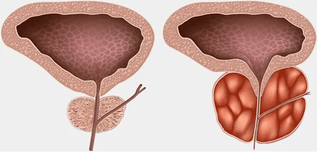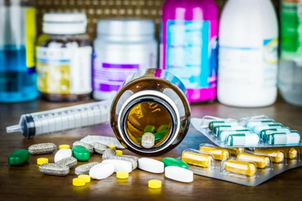
In the treatment of prostatitis, drug therapy is most often prescribed. During its course, the patient should take medications of different categories. Some aim to eliminate the symptoms that cause anxiety, while others act intentionally directly on the affected gland, eliminating the most important thing - the root cause. At the same time, medications vary in the strength of the effect, as some aim to eliminate acute, while others are chronic counter. Let’s take a look at the most popular medications used in treating prostate inflammation.
Types of prostate medications
All medicinal products prescribed by the doctor can be conditionally divided into several categories according to the method of administration:
- Tablets and capsules- taken orally, moderately absorbed by the body, in the case of capsules, absorption occurs much faster, as all ingredients reach their destination shortly afterto digest gelatinous skin.
- Injections- these can be liquid preparations and powders, which are then diluted in a working fluid, usually an anesthetic, administered intramuscularly or intravenously, and the effect can be noticed after a few minutes. . . Rectal suppositories (suppositories) and submerged.
- Instructions- a group of drugs that have the maximum positive effect only in the case of direct entry into the area of the affected prostate gland, the method is used in a hospital setting, as the insertion is made through the urethra.
- Micro-clickers- as a rule, these include non-medicinal drugs, for example, herbal decoctions, they are not able to replace drug therapy, but can be a good medicine for relievingpain or their prevention.

It is worth noting that several types of medicines can be sold in several forms at the same time, for example, tablets and suppositories, so the attending physician should show this characteristic without any doubt.
The most popular drugs for the treatment of prostatitis
Treating prostatitis with medication is a rather complicated procedure that requires the doctor to choose the right medication that not only relieves pain and eliminates other symptoms with manifestations, but also helps eliminate the underlying cause of the disease. The disease itself can also have a different origin, appear in acute or chronic forms and offer a wide range of concerns to the patient, limiting it to both natural issues and lead to complete infertility.
Classic tablets, intramuscular injections, and suppositories for colon administration can be used to treat prostatitis. The choice of a drug depends directly on the urgency of the delivery of its components to the affected organ.
Additional tools
Treatment of prostatitis is not limited to a list of certain medications. Specialists can also use other types of drugs of different categories.
Fluoroquinolones
Fluoroquinolones are antibacterial drugs used to treat the tuberculous origin of prostatitis. These tools are used in a complex way and the patient can be prescribed a course consisting of four or more medicines at the same time.Cephalosporins
Cephalosporins are antimicrobial drugs that target specific types of bacteria.Such drugs can be broad-spectrum and one-way, and the need to use one or another agent depends directly on the form of the disease and the cause of its occurrence.
Macrolides
Macrolides are rarely used in the treatment of prostatitis, as they are intended to fight certain types of bacteria, such as mycoplasma and chlamydia. By the way, a disease such as chlamydia is often accompanied by prostatitis, so doctors prescribe several tests at once to identify problems with the prostate gland in the early stages.
In acute manifestations of prostatitis, the doctor may prescribe several drugs of different categories at the same time. This approach allows you to deal effectively with both the symptomatology and the disease itself.
Analgesics
The vast majority of analgesics are prescribed in the presence of acute pain syndrome, which is an integral companion of chronic but more often exacerbated forms of prostatitis. The use of drugs belonging to this group outside the framework of drug therapy aimed at eliminating the disease is not strictly recommended, as the body quickly gets used to them, and to achieve an analgesic effect, an increase in dose will be required, whichcan adversely affect the liver and kidneys. The analgesic course is described on an individual basis.Alpha-blockers and muscle relaxants
The main task of these groups of drugs is to relieve tension from the spasmodic muscles of the bladder, urethral canal and also to reduce the pressure in the pelvic region. These remedies help to get rid of the feeling of discomfort and normalize the urination process.
Immunomodulators
Such preparations essentially contain natural ingredients, in the case of prostatitis - extracts based on the prostate gland tissue of cattle. Regardless of the drug, they all have a common principle of action, allowing:
- to slow down the flow of inflammatory processes;
- increase smooth muscle tone and bladder walls;
- to minimize the possibility of blood clots;
- improve blood circulation to the prostate gland;
- reduce prostate volume.
Immunomodulators can be used for a number of diseases, including chronic prostatitis, acute non-infectious prostatitis, prostate adenoma.
In addition, such funds are actively used for prophylactic purposes, which helps to prevent the onset of disease or its recurrence.
Vitamins and dietary supplements
Tools that fall into these categories can reduce inflammation, improve fluid drainage, and get rid of congestion. The need for such drugs is also due to insufficient intake of beneficial nutrients in the body, especially during the course of antibiotics.
Prostatitis is a very complex disease that should be treated only by a real specialist. Medication self-selection is not strictly recommended, as with this approach there is a high probability of complications in the form of infertility, impotence, and even the risk of developing cancer increases. Using prostate medication without consulting a doctor can lead to the fact that it will be impossible to get rid of the disease without surgery. In addition, self-treatment is complicated by the inability to make an accurate diagnosis, as this requires appropriate equipment and knowledge.
It should also be remembered that most medications used to treat prostatitis are quite toxic, and some types are simply incompatible. If you feel pain in the pelvic area during urination, defecation or ejaculation, go to the toilet often and can not empty your bladder normally, do not risk it - visit your doctor. Thus, you will not only prevent the unfavorable course of the disease, but you will be able to avoid the development of its chronic form, with which you will have to live your whole life. In addition, your sexual function will not be impaired and with timely treatment, you can have a completely normal and healthy offspring.
























